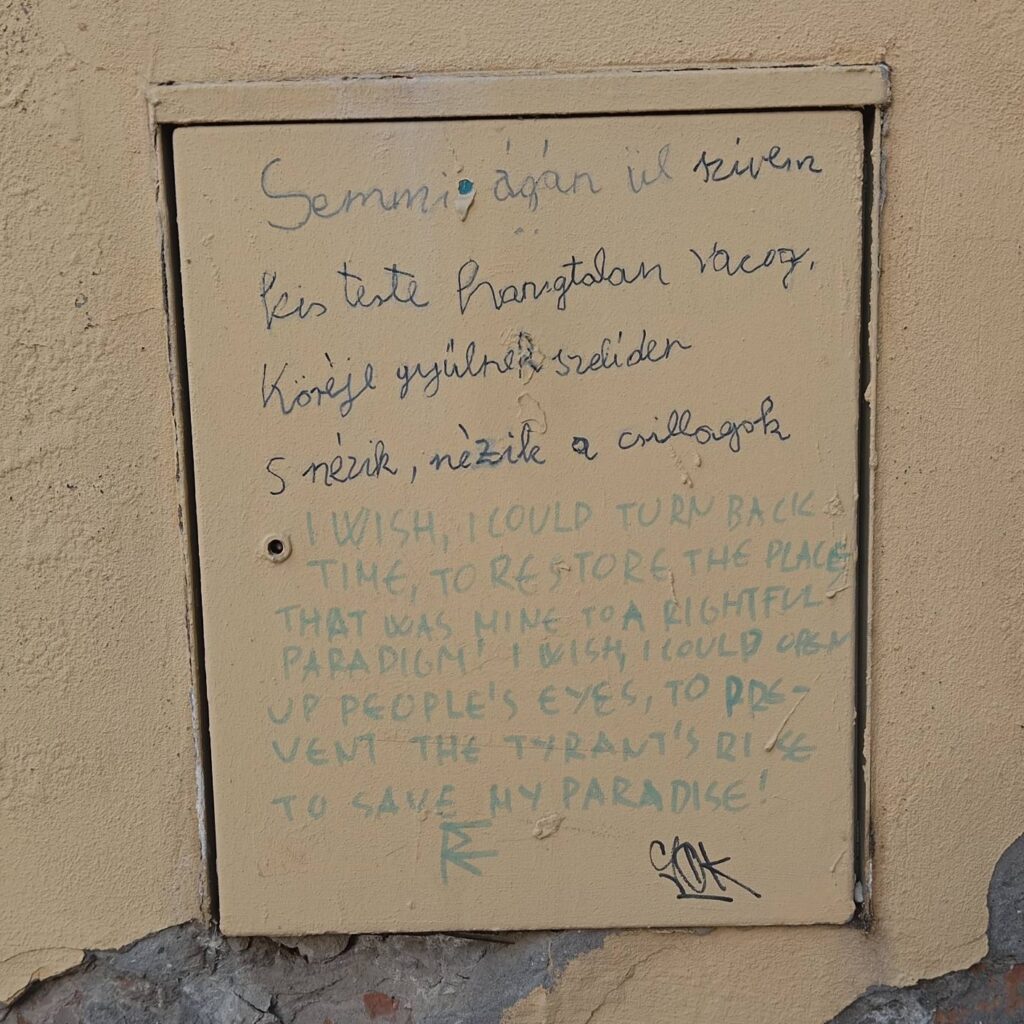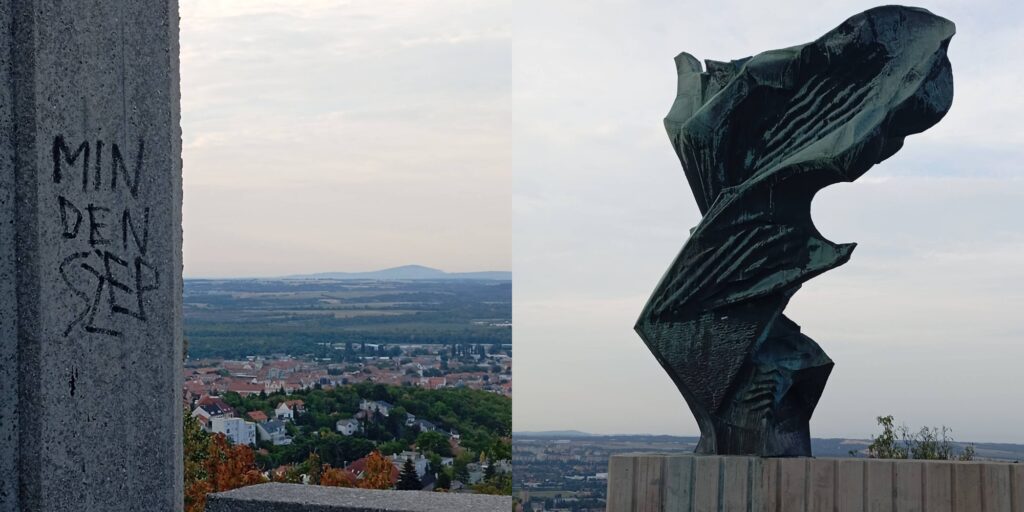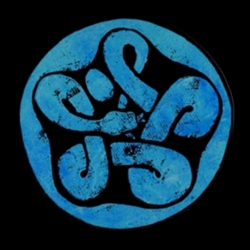- augusztus 23. péntek 11:09

(A fotót a CCC hete alatti egyik hajnali sétámon csináltam. // I took this photo on one of my morning walks during the CCC week.
A négy magyar sor híres József Attila idézet, az angol szöveg forrását nem találtam meg. // The four Hungarian lines are from a famous poem by Attila József. I have not found a source for the English text.)

(A pécsi Niké-szobor, és mellette a falfirka // The statue of Niké, and the graffiti next to it: “Everything is beautiful”)
Öt napja ilyenkor már kilenc perce vége volt a CCC utolsó, vasárnap délelőtti nagycsoportjának.
Tagadhatatlan, hogy elszaporodtak a regresszív állapotaim, mióta hazajöttünk Pécsről. Hétfőn, kedden, szerdán és csütörtökön reggel is eszembe jutott, hogy na tessék, megint egy nap, amikor már nincs CCC. Nem lesz 9-11-g nagycsoport, nem lesz utána és délután még egyszer kiscsoport. Az igényei krónikus kielégítetlenségétől hol kétségbeeső de kétségbeesését önmagába rejtő, annak tartalmazására ráfeszülő, hol meg rezignált, disszociatív dödörgésbe süppedő gyerek közel jött a felszínhez, az ablakhoz, kinézeget.
Akartam írni róla, az egyhetes encounterről, ami a CCC. Már akkor fogalmazgattam, amikor még tartott, és azóta is minden nap jár a fejem rajta, de eddig nem kezdtem bele, halogattam. Ha belekezdek, akkor utána már nem kezdhetek bele újra, legalábbis először semmiképp, és ha a végére érek annak, amit mondani tudok, akarok, akkor többet már nem érhetek a végére, mert ha még átírom, pontosítom, meggondolom, akkor az még nem a vége volt, de ha meg tényleg a végére érek, akkor az tényleg a vége. És mi van, ha nem sikerül? Mármint megragadni, összerendezni, érthetővé tenni a megrázóan erős lelkesedésemet?
Most legyen akkor az, hogy ami nem megy, az erőltetni kell!
Így fogalmazgattam: tudtam én, gondoltam én, hogy jó lesz, de arról fogalmam sem volt, hogy milyen sokféleképpen és hogy mennyire intenzíven lesz jó. Ez lenyűgözött. Még magamnak is feltűntek a szuperlatívuszaim, és arra gondoltam, talán ez túlzás, már megint ez az “elképesztő”-zés, amire Verus is néha felhívja a figyelmemet, mosolyogva.
Volt, akinek ironizálva meséltem el, hogy átestem egy egyhetes agymosáson és lelkes szektatag lett belőlem: alig várom a következő szeánszot és izomból térítek. Tíz éve, az első, hollandiai aya szertartás után voltam talán ennyire hevesen, tüzesen lelkes. Rátaláltam valamire, amiről, miközben rátaláltam, rögtön kiderült, hogy mennyire hiányzott, pedig nem is tudtam róla.
A hiány, amit betöltött, annyira állandó, annyira része az alapzajnak, hogy már nagyon régen nem esik nehezemre megfeledkezni róla. Viszont ha erről a hiányról megfeledkezem, ha az elkerülhetetlen alapműködés részeként figyelmen kívül hagyom, akkor figyelmen kívül hagyom egy olyan részemet, amelyikkel pedig foglalkozhatnék. Foglalkoznom gyümölcsöző lehetne.
Ezt úgy is mondhatni, hogy egy kicsit, de egyfolytában magamon kívül vagyok. A kiszínezésem kívül megy a vonalon. És ezt is – ami alapesetben azért ijesztő, vagy legalábbis figyelmreméltó kéne hogy legyen – képes vagyok normalizálni, azaz figyelmen kívül hagyni. De a CCC-n szembesültem vele.
Mondjuk mintha a bőröm egy nagy sebfelület lenne. El lehet lenni a hegekkel, csak néha, ritkán fájdalmas meg nehézkes, itt-ott csökkent a szabadságfokom. Vedleni munkás, igénybevesz, és biztonságos közeg is kell hozzá. Most olyan közegbe kerültem viszont, ahol egyszerre vált hangsúlyossá, került előtérbe az, hogy mitől fosztom meg magam, ha nem képviselem ezt az elfojtott igényemet, és indult meg egy erős önvisszanyerési kísérlet, vagy hullám. Önismereti dagály.
Na de mi ez a hiány? És mit kaptam, mit szereztem, mit tanultam, mit tapasztaltam, mire emlékeztem vissza?
Valami olyasmi ez, mint amit Ivan Illich úgy nevezett, hogy conviviality. Örömteli, barátságos együttlét, életközösség. Olyan szociális környezetben lenni, ahol az a rugalmas de stabil többségi nézet, a bevett és köztudott tapasztalat és megállapodás, hogy jó az embernek nyitott, érdeklődő, önazonos, önelfogadó állapotban jobbára nyitott, érdeklődő, önazonos, önelfogadásban lévő, de még ha épp nem is, ezeket akkor is értéknek és életcélnak tekintő embertársai körében időzni. Jó, mert termékennyé tesz, gyógyít, felszabadít. Ez az értékrend, ez a törekvés, ez a tapasztalat az én személyes elvárásom az emberiséggel szemben, és arra is vágyom, hogy minél többen vegyék észre, ébredjenek rá, fogadják el és ünnepeljék, hogy ez így van. Vagy hogy lehet, lehetne így.
A szombat esti, a héten utolsó, számomra viszont az első kocsmázás közben és után többeknek is ellelkendeztem, hogy bizonyos értelemben az volt nekem a csúcsélmény. Soha életemben nem igazán értettem, hogy mi abban a jó, hogy egy csomó ember elmegy egy kényelmetlen és zajos helyre, ahol létezni is pénzbe kerül, és ahol aztán beszélgetni próbál, de ez a külső akadályok meg a sokféle belső akadályok következtében többnyire meghiúsul, a többség lassan lerészegedik és végül sikeresen kerül érzelmileg sérülékenyebb és bevállalósabb állapotokba, bár másnap könnyen lehet, megbánja, ami történt.
Most meg az az élményem lett (55 vagyok: jobb későn, mint soha), hogy van egy ilyen teljesen más dolog is, amit szintén kocsmázásnak hívnak, hogy 30-40 ember 5-6 spontán kisebb-nagyobb asztaltársaságot alkot, és tényleg bízhatok abban, hogy szinte bármikor szinte bármelyikben találok magamnak helyet, és embereket, akik számomra is fontos kérdésekről beszélgetnek egymással.
Szerencsére sokféle értelem van, és így sokféle csúcsélmény: a nagycsoportban eleve van valami szertartásos, rituális, amire csak rátesz a folyamatos fordításból származó lassítás… idő- és térmikroszkóp alatt látszik az, hogy milyen, ha – ami olyan végtelenül ritka lett, sajnos – ennyire sok ember egységes csoportként önmagára hangolódik. Adódik benne alkalom végigjárni a teljes érzelmi skálát, tehát nem csak öröm, helyeslés, biztonság, kiváncsiság, izgalom, rokonságérzet, elfogadás, támogatás, szimpátia, megtartó figyelem, uh-oh, akkor még ezt a szót is, hogy szeretet… hanem bánat, közöny, unalom, ellenségesség, félelem, nyomottság, idegenség, zavarodottság, elutasítás, káröröm, harag, undor, szégyen is jöhet – de valahogy az egésznek mégis újra és újra emelkedett jelenléte lesz.
Bár a nagycsoportban is, de a kiscsoportban különösen erős a megismerési folyamat. Az önként és közösen vállalt, hirtelen közelségtől észrevehetem, feltűnhet, hogy tudattalanul is kombinálok, és igyekszem az egyes szereplőket valami már aránylag jól modellezett, ismert szerepbe, kategóriába betenni. És észrevehetem, feltűnhet az is, ahogyan ez a törekvés, megintcsak az önként és közösen vállalt, hirtelen közelség okán, frusztrálódik, újra és újra: beszélgetőpartnereim ismételten másmilyennek mutatkoznak, mint amire számítok tőlük: az eddig ellenszenves hirtelen rokonszenvet ébresztő oldalát mutatja meg, a bölcs öreg hirtelen mosolyogtatóan naívnak tűnik. Míg aztán lassan feltárul a csendesebb, lassabb, hatékonytalanabb, de érdekesebb ösvény: megbékélni azzal, hogy nem tudom megfejteni a többieket, mert sokkal nagyobbak és részletgazdagabbak annál, mintsem hogy pár óra alatt átlássam őket… és aztán megtalálni ebben az örömöt is.
Lassan egyre kevésbé csalódásnak, szégyenspirálok felkorbácsolására alkalmas alulteljesítésemnek érzékelni azt, ha a másik újra és újra meglep. Lassan észrevenni és elfogadni, hogy bár kiismerni ki lehet valakit úgy, hogy addig pontosítom róla a modellemet, amíg már nem lep meg többé (bár ez a folyamat lényegét tekintve okklúzió is – nyilván mindenki mindig több, mint amennyit érzékelek belőle, és ha meggyőzöm magam, hogy kiismertem, tulajdonképpen megtanulom egy jó nagy részét figyelmen kívül hagyni, lényegtelennek tekinteni), de megismerni más, mint kiismerni: ott megmarad a lehetősége annak, hogy pont az, aki épp nagyon közel került már, új oldaláról mutatkozzon meg – és bár ez kiszámíthatatlan, mégis inkább érdekes, mint ijesztő. Ráadásul ez a valaki lehetek adott esetben, más vagy akár a magam számára, én is.
Amennyire egyáltalán lehetséges, biztos vagyok benne, hogy ott leszek jövőre is.
//
23 August 2024 – Friday – 11:09
Exactly five days ago, the last, Sunday morning large group of CCC had been over for 9 minutes.
It is undeniable that since we have returned from Pécs, I find myself in regressive states more often. On Monday, Tuesday, Wednesday and Thursday morning I kept having the thought that, sadly, here was another day with no CCC. No large group from 9 to 11, and no small group afterwards and once more in the afternoon. The small child, at times despairing of the chronic unmetness of his needs and tense from having to contain that despair, and at other times resigned and submerged in dissociative rhythmic self-soothing has come closer to the surface, closer to the window, and he is peeking out.
I wanted to write about the one-week encounter that is CCC. I was already formulating sentences while it was still going on, and things I would want to say keep occurring to me every day since, but I haven’t yet started. I procrastinated. If I do start it, I will not have the option to start it anymore, certainly not for the first time, and if I get to the end of what I am able to and what I want to say, then I will no longer have the option to reach that end, because if I revise it, render it more accurate, rethink it, then I had not reached the end. And if I do reach the end, that will be the end of it. And what if I fail? I mean to grasp the essence, to organise it coherently, to make my tremendously strong enthusiasm palpable?
So let’s see what happens if I try harder.
Here’s a sentence I was planning in my head: I knew, I really thought it would be good for me there, but I had no idea in how many different ways and how intensely it would be good. I found that mesmerizing. Even I noticed my stream of superlatives, and so I thought perhaps I am going to excess, once more I keep saying “Amazing! Amazing!” – as I sometimes do, and Vera smiles as she brings it to my attention.
So some people I told from a position of irony. I said I’d just been through a one-week brainwashing exercise, became an enthusiastic member of a sect and I’m putting all my muscle into converting others. I think it was ten years ago, after my first aya ceremony, in Holland, that I was so intensely, burningly enthusiastic. I found something, and the process of finding it was also the process of discovering how much I had missed it, though I hadn’t known that I did.
The lack that was being fulfilled is so consant, so much a part of the background noise that for quite a long time know I don’t find it hard to forget about it. But if I forget this lack, this unmet need, if I disregard it as an unavoidable component of my fundamental process of operation, then I also disregard a part of myself that I could actually work with. And working with it could be fruitful.
Another way to put this is that although only mildly, but I am beside myself all the time. The colouring goes outside the lines. And, despite the fact that I should really find that a little alarming or at least worthy of attention, I am even able to normalise, and then to disregard it. But I came face to face with it at the CCC.
Say my skin is one large surface of scar tissue. It is quite possible to get by with the scars, it is only rarely that it is painful had lumbersome, here and there my degrees of freedom are reduced. Shedding my skin is a lot of effort, it makes heavy use of the whole of me, and it is best done in a safe environment. Well now I found myself in a context in which, at the same time, there was a strong emphasis on what I deprive myself of if I do not stand up for my suppressed need, while also there started a strong experiment, or a strong wave of self-recovery. A flow-tide of self-acquaintance.
But what is that lack, that unmet need? And what did I receive, what did I get for myself, what have I learnt, what have I experienced, what did I remember?
It is something like what Ivan Illich called conviviality. Joyful, friendly togetherness, the sharing of lives. To be in a social environment where it is the flexible yet stable majority view, the received and publicly known experience and agreement that it is good for humans to be in a state of openness, curiosity, authenticiy and self-acceptance, and in that blessed condition to be in the company of fellow humans who are also mostly open, curious, authentic and self-accepting – or if not, then fellow humans who also see those attributes as valuable and worth aiming for in life. It is good because it encourages creativity, it heals, it liberates. And those values, that striving and that experience also constitute my personal expectation from humanity. And I also wish for a world in which more and more people notice, recognise, accept and celebrate that this is true. Or can be, could be true.
At the evening pub session on Saturday, which was the last one in the week, but the first one for me, I enthused to a number people about how in one sense that evening at the bar was the peak experience of the CCC for me. Never in my life have I really understood what is good about a bunch of people going to an uncomfortable and noisy facility, where being alive costs money, then trying to converse with each other but failing due to various external and internal obstacles, followed by intoxication for the majority, which finally delivers them to emotionally more vulnerable and outgoing states, though many of them may regret that the next day.
This time (I am 55: better late than never) I had the novel experience that in fact there is also this other, completely unrelated thing which is also called going down the pub: in this version, 30 to 40 people spontaneously for 5-6 tables of varying size, and I can feel really confident that at almost any moment there will be a place for me at any of those tables, and I will find people discussing matters that I find important and often fascinating.
Luckily, there are a number of different senses, and varied peak experiences to go with each one. In the large group, there is something ceremonial, ritual, which is strengthened further by the constant brakes that the translation puts on the proceedings… under a temporal and spatial microscope it is possible to see what it is like when such a large group of people becomes a single entity and reflects upon itself. There is room to run the full range of emotions, not only joy, approval, safety, curiosity, excitement, kinship, acceptance, support, sympathy, positive regard and uh-oh, also love, but also sadness, indifference, boredom, hostility, fear, depression, alienation, confusion, rejection, schadenfreude, anger, disgust and shame can all appear in the spotlight – and yet the whole thing returns, again and again, to an elevated presence.
It is there in the large group, but the epistemic process becomes particularly forceful in the small group. As a result of the voluntary shared undertaking of sudden closeness, I am able to notice and find remarkable that without being aware of it, I am running through combinations, trying to resolve the individual group members to relatively well-modelled and known roles, or categories. And I can notice, and find remarkable, how that goal-directed mental exertion, once again thanks to the voluntary, shared undertaking of sudden closeness, is frustrated over and over again: my conversational partners keep being other then what I expect them to be: someone I thought I was averse to suddenly appear in a light that inspires my sympathy, while the wise old man suddenly appears to be endearingly naive. And eventually the quieter, slower, less efficient but more interesting path is revealed: it is coming to peace with the fact that I cannot see through the others, because they are all so much greater and so much richer in detail than anything I may have a hope of figuring out in a few hours… and then finding joy in it being so.
Slowly, I no longer perceive being repeatedly surprised by the other person as my failure, as reason to be disappointed in myself and to agitate the vortex of shame. Slowly, I notice and accept that while it is possible to figure someone out by making my model of them increasingly accurate until they no longer surprise me at all (although that is also essentially a process of occlusion – it is obvious that everyone is always more than I perceive of them, and by convincing myself that I have figured the other one out, I actually learn to disregard a large part of them as uninteresting), but truly encountering someone, getting to know them, is not the same as figuring someone out. Encountering the other maintains the possibility that the very person who has come ever so close may reveal a new side – and while that is unpredictable, it is more interesting than scary. What’s more, on occasion that other – for others, or even for myself – can even be me.
To the extent possible, I am certain that I will be there again next year.


Drága Brunó!
Utálom magam irásban kifejezni,( merthogy gimnazista magyar dolgozataim görcse, elég jó e imádott magyar tanáromnak, amit irok , lustaság miatt, stb stb), de ha kapok ajándékot, pláne ilyen szépet és pontosat, mint amit Tőled, hát meg kell köszönjem. Az érzés, amit az irásod keltett bennem , visszahozta azt az állapotot, ami az első CCC végén -után jött, ugy éreztem magam, mintha a belsőm valahogy kifordult volna, de baj nélkül, mint egy fregoli kabát, a külső egyszinü sötétkék helyett drapp kockás jelent meg.(Apámnak volt ilyen kabátja).Aztán akkor az eufória lassan elmult, és visszasüppedtem előző állapotomba,(részben hála istennek, mert
elég veszélyesnek éreztem a fellazultságomat )de vágyódtam utána, és a legközelebbi CCC-ken is jött, bár egyre halványabb intenzitással. DE ki a kicsit nem becsüli…..üdv!
Kedves Éva! Köszönöm a visszajelzést. Érdekesnek találtam, hogy azt mondod, fellazultságod az egymást követő CCC-ken egyre csökkenő mértéket mutatott. Vajon miért? Vagy az is lehet, hogy nem csökkent igazából a fellazultság mértéke, csak számodra lett ez egyre ismerősebb terep?